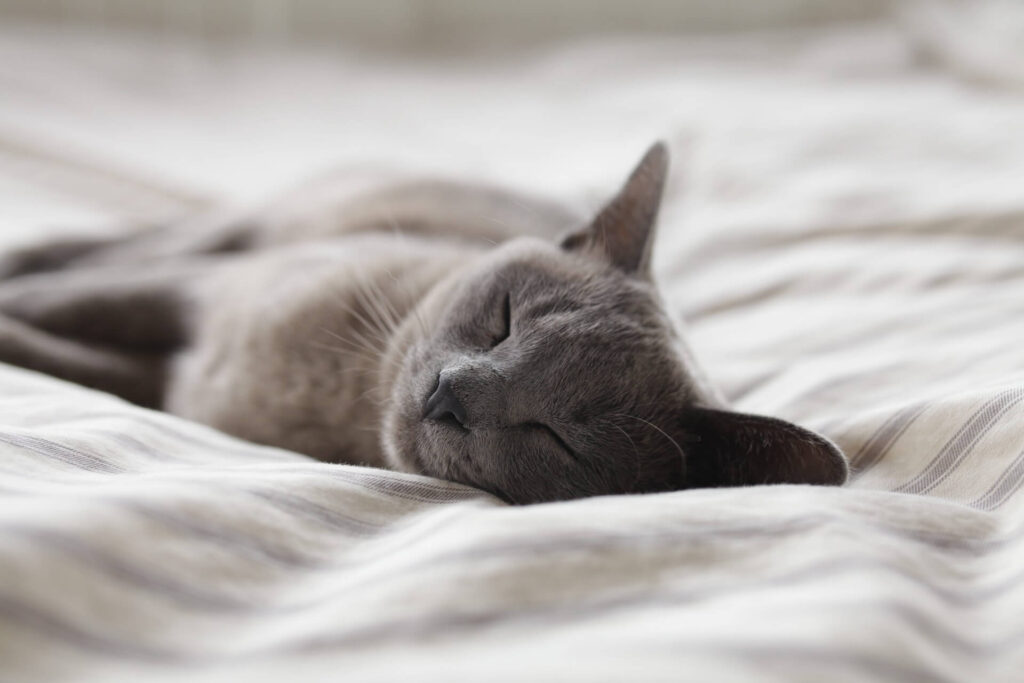You walked out of your room and noticed that your cat had a potty accident. Instead of peeing in the litter box, they peed on the living room’s floor. You noticed a part with a different color, and you leaned in closer to find out that it could be blood.
Why is my cat peeing blood? What should I do?- you wonder.
We know how alarming it can be to find blood in your cat’s pee, especially if they act as if nothing happened. That’s why we made this guide to help you know why your cat is peeing blood and what you should do about it.
Reasons why your cat is peeing blood
Blood in the urine, also known as hematuria, can be caused by abnormalities in the urinary tract and disease processes elsewhere in the body that can affect the urinary tract and kidneys. Here are specific reasons that may cause blood in your cat’s urine:
1. Stress
If your cat is peeing blood but acting normal, it may be due to stress. The medical term for this is stress cystitis.
Our cats may get stressed by factors such as routine alterations or picking up their owner’s emotions. Their stress can show up in various ways, like having blood in their poop or pee, which is more frequent for young to middle-aged cats.
Stress cystitis symptoms resemble urinary tract infections – straining to urinate, crying while urinating, passing small amounts more often, urinating outside the litter tray, blood in urine, and licking around the genitals. However, urine testing usually indicates no bacteria. It is believed that stress or anxiety can cause inflammation in the bladder, similar to infection.
2. FLUTD
FLUTD or Feline Lower Urinary Tract Disease is also known as feline idiopathic cystitis (FIC) and feline urologic syndrome (FUS). This condition can be a serious reason your cat is peeing blood.
Cats with feline lower urinary tract disease (FLUTD) have a variety of conditions affecting their bladders and urethras. Symptoms of FLUTD include difficulty and pain when urinating, increased frequency of urination, and blood in the urine. Furthermore, cats with this condition tend to lick themselves excessively and may urinate on cool, smooth surfaces outside the litter box, such as a tile floor or a bathtub.
3. Urinary Tract Infection (UTI)
When your cat’s immune system is compromised, bacteria may enter the body, go to the bladder, and cause an infection. When that happens, they will experience a condition called Urinary Tract Infection or UTI, and peeing blood is its common manifestation. Moreover, change in food or diet may also cause this.
4. Bladder Stones
A bladder stone is composed of minerals, crystals, and organic material that collects in the bladder. They are also known as “uroliths.” People can get them, but cats can too. Typically, they result in the inflammation of your cat’s bladder.
Cats may develop these rocks as small as a few millimeters in diameter or as large as several millimeters. These stones can rub against the bladder’s walls, causing inflammation and pain. In addition to causing blood in your cat’s pee, it can block your cat’s urethra and make urinating difficult or impossible.
5. Cancer
It is very rare for cats to develop bladder cancer. Transitional cell carcinoma (TCC) is the most common cancer affecting the urinary bladder. TCC, although rare, is malignant cancer that usually develops from the lining of the bladder or urethra in cats.
This condition is life-threatening. In the absence of prompt veterinary intervention, urethral obstruction and the cat’s inability to urinate can have fatal implications.
Calling your Veterinarian is the best way
When your cat is peeing blood, you should call your veterinarian immediately and schedule an appointment for a check-up. Searching the internet for cat peeing blood home remedy is not recommended. You already read above that the reasons why your cat is peeing blood can go to something serious as cancer. Thus, you should not handle this with home remedies. Doing so will only delay the time that your cat should be receiving the appropriate treatment already.

Since there are several causes of hematuria, your veterinarian will conduct several tests to determine the right cause. In addition to blood and urine samples, urine cultures, and viral testing for feline leukemia and feline immunodeficiency virus (FIV), veterinarians may also conduct exams, including x-rays and abdominal ultrasounds.
Depending on your cat’s condition, your veterinarian would likely prescribe some medications. They may also advise you to reduce your cat’s exposure to stress, change their diet or food, and encourage their increased water intake.
Common Question About Cat Peeing Blood
1. How serious is cat peeing blood?
Bloody urine can be a sign of serious medical conditions- from infections to cancer. It is always best to consult your veterinarian immediately.
2. Can a cat UTI go away by itself?
Some urinary tract infections can go away without intervention if you continue enhancing your cat’s immune system. However, any infection should not be ignored and should be taken to your veterinarian’s attention to avoid escalating to a more severe problem.
3. How long does cat cystitis last?
As long as you follow your vet’s treatment plan for your cat, the condition should resolve in 3 to 7 days. Moreover, increasing your cat’s water intake will help their fast recovery.
4. Is cat cystitis an emergency?
No, it is not. However, if you see blood in your cat’s urine, it could be an indication of a more serious condition that needs to be treated. As with most medical conditions, the sooner you treat it, the better the outcome.
5. Is my cat dying from blood in urine?
No, if you catch it early. However, if you ignore it and there is a serious cause (such as cancer or severe infection), it can lead to death if your cat does not receive proper medical attention.
6. Does kidney failure in cats cause blood in urine?
Yes, this is one symptom of kidney disease in cats. If your pet has chronic kidney failure, there will be an increase in protein levels in his blood stream. This leads to high blood pressure and congestive heart failure (CHF). The high blood pressure can lead to damage of small blood vessels that connect the kidneys with the bladder and urethra (the tube through which urine passes from the bladder). These damaged vessels can bleed into the urine. If enough damage occurs, there will be visible blood in your pet’s urine.
Prevention is Better than Cure
Making sure our cats are healthy and avoiding food and other things that may cause kidney problems is still the best way. When our cats are sick, they become lethargic, and you will be able to see the sadness on their face. You can avoid that by ensuring your cat is eating healthy, drinking lots of water, and receiving proper nutrition and the best care.





